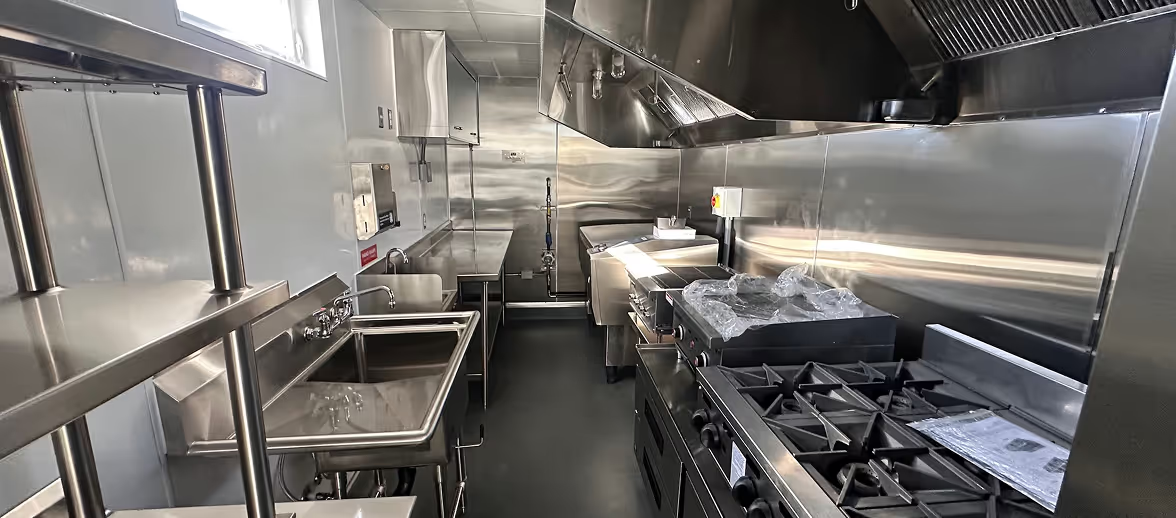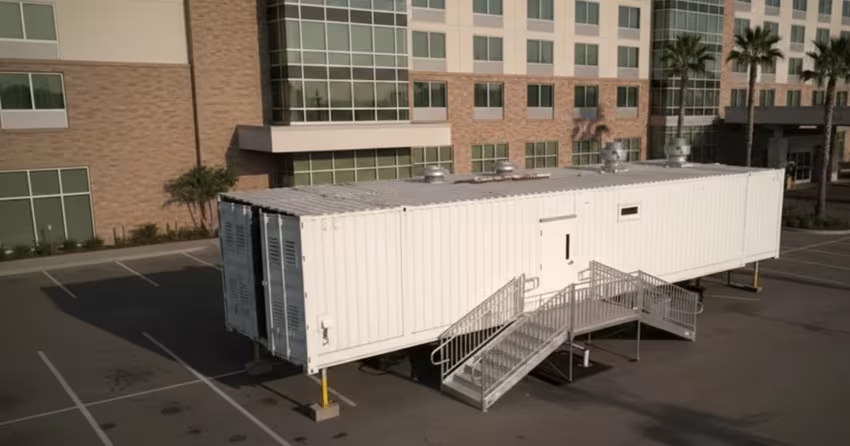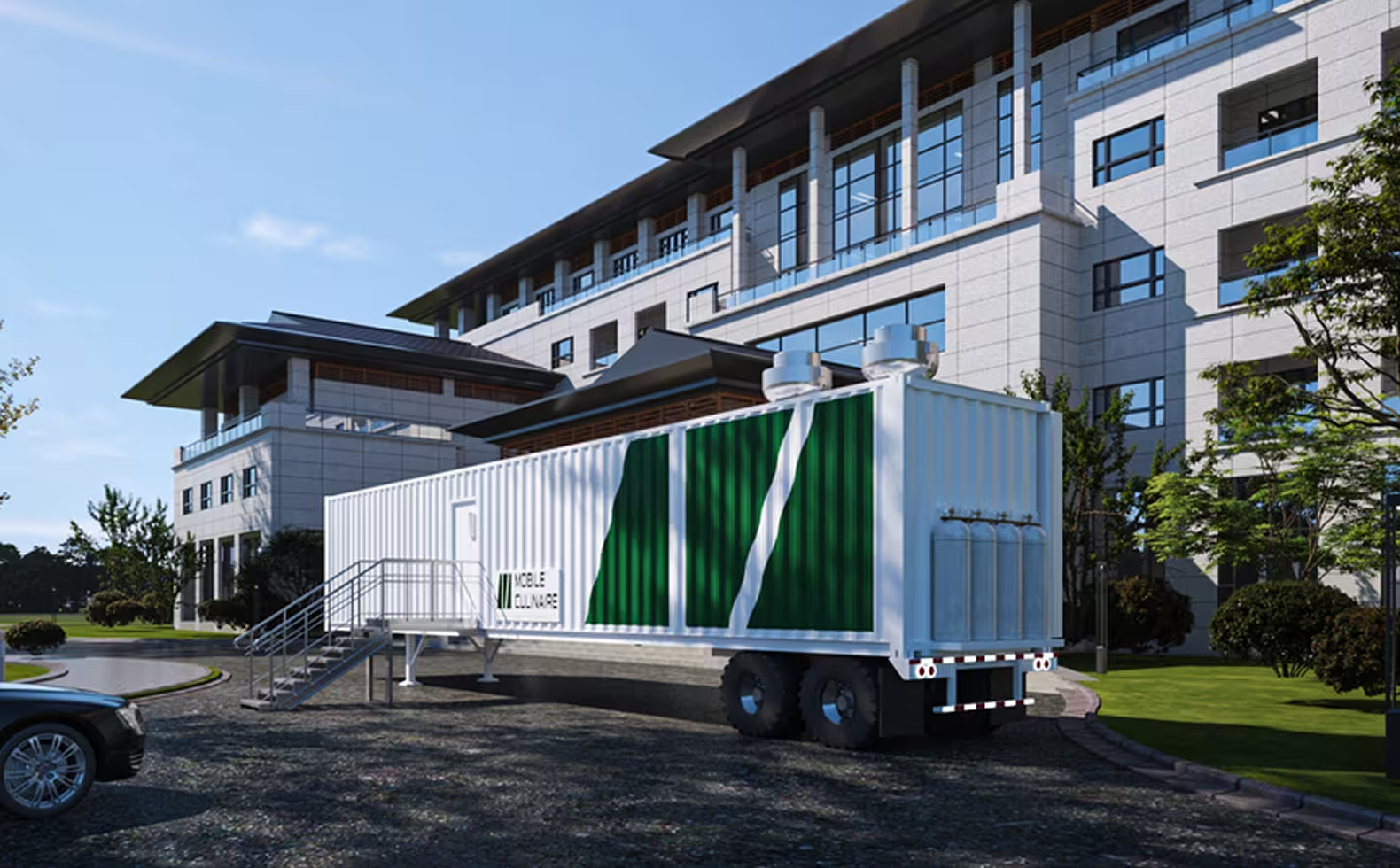%2520(1)%2520(1).avif)
Introduction
What does it really take to operate a kitchen trailer legally in the United States? Nearly every city enforces its own set of rules, from fire codes to health permits, making the regulatory landscape complex for chefs, hoteliers, and event organizers focused on delivering memorable dining experiences.
Whether you’re hosting a temporary event, renovating a main kitchen, or testing a mobile foodservice model — securing the proper licenses, permits, and inspections is essential to avoid fines, delays, or shutdowns.
Kitchen trailers have become a flexible solution but compliance is what makes them sustainable. In fact, an analysis of over 260,000 food inspection reports across major U.S. cities found that mobile kitchens such as food trucks often record fewer health code violations than traditional restaurants — a testament to how effective permitting and inspections are at protecting public safety and customer trust.
This article covers the key requirements for running a kitchen trailer in the U.S., including health department approvals, zoning and parking permits, fire safety requirements, and insurance considerations. It also highlights how providers like Mobile Culinaire simplify compliance with rental-ready trailers designed to meet code from day one.
What Is a Kitchen Trailer Rental?
A kitchen trailer rental is a mobile modular unit equipped with commercial-grade appliances, utilities, and prep areas for professional cooking and foodservice. Unlike food trucks, which are self-propelled, trailers require towing but usually offer more space and restaurant-quality layouts.
Rentals are commonly used for:
- Catering events
- Disaster relief operations
- Temporary kitchen replacements during renovations
- Seasonal or pilot food businesses
This flexibility makes them an attractive option for hospitality groups, chefs, and organizations that need a temporary yet fully functional commercial kitchen.
Why Kitchen Trailers Need Licenses and Permits
Operating a kitchen trailer is more than just plugging in equipment and serving meals. Because foodservice directly impacts public health and safety, every jurisdiction enforces licensing and permitting requirements. The FDA Food Code provides a national benchmark, but states and municipalities frequently add their own rules. A kitchen trailer is classified as a mobile food facility, which means operators must comply with sanitation, zoning, and fire safety standards at the local level.
When you rent a kitchen trailer, providers like Mobile Culinaire deliver units designed to meet national fire and health codes. However, the renter is still responsible for securing local permits, licenses, and event approvals. This distinction is critical: while the trailer itself is compliant, its use in any given city or county requires official documentation and inspections.
Licensing isn’t just bureaucracy, it’s what ensures compliance, protects operators from liability lawsuits, grants legal authority to serve food, and speeds up approvals for events or temporary sites.
%2520(1).avif)
Licenses Required for Kitchen Trailer Operations
Business License & Structure
Before you can legally operate a kitchen trailer, you must establish your business structure. Options include:
- Sole Proprietorship – simplest structure, but offers no liability protection.
- Limited Liability Company (LLC) – the most common choice for mobile foodservice because it shields personal assets from business debts.
- Corporation – more complex but beneficial for larger organizations or investors.
Once chosen, you must register your business with the state. Many cities also require a local business license to operate legally within their jurisdiction.
Example: Los Angeles charges $50–$100 annually for a basic food vendor license, while New York City requires separate mobile food vendor permits that can cost thousands due to limited availability.
EIN (Employer Identification Number)
If you plan to hire employees or open a business bank account, you’ll need an Employer Identification Number (EIN). This is issued for free by the IRS.
- Why it matters: Many state agencies require an EIN when applying for food licenses or tax registration. Event organizers may also request it on vendor forms.
Sales Tax Registration
Because food sales are taxable in most states, operators must register with their state’s Department of Revenue to collect and remit sales tax. For example:
- In Texas, food trailer operators register through the Texas Comptroller.
- In Florida, vendors apply for a Sales Tax Certificate before serving food.
Failure to register can result in fines and back payments, even if your kitchen trailer is rented for a short-term event.
Food Trailer License
A food trailer license (sometimes called a mobile food facility license) is the foundational license allowing you to legally prepare and sell food from a mobile unit.
- Cost: Typically ranges from $100 to $1,000 annually depending on location (SBA).
- Process: Often requires submitting a trailer layout plan, equipment specifications, commissary agreement, and passing an initial inspection.
- Tip: Even if your rental trailer is pre-approved for compliance, you (the operator) must apply for the license in your own business name.
Mobile Food Vendor License
Many cities require a mobile food vendor license in addition to the food trailer license. This governs where, when, and how you can operate. For example:
- Some cities restrict vending near schools or require trailers to park a set distance (e.g., 200 feet) from restaurants.
- Hours of operation may be limited to daylight hours or specific zones.
- Festivals and fairs often require a temporary vendor license for the event.
This license ensures mobile kitchens integrate fairly with existing businesses while maintaining public order.
%2520(1)%2520(1).avif)
Permits and Inspections for Kitchen Trailer Rentals
Health Department Permit & Inspections
Every kitchen trailer must pass a local health department inspection before opening for business. Inspectors check for:
- Handwashing sinks with hot and cold running water
- Adequate potable water and wastewater tanks
- Refrigeration that holds food at 41°F or below
- Hot-holding equipment that maintains food at 135°F or above
- Sanitation practices and cleaning supplies
- HACCP plans or temperature logs for high-risk foods
- Pest prevention (sealed entry points, covered storage)
Health inspections also occur periodically throughout the year, and at temporary events inspectors may spot-check compliance on-site. According to the CDC, 1 in 6 Americans gets sick from foodborne illness each year, making these inspections vital for public safety.
Commissary/Servicing Agreement
Many jurisdictions require kitchen trailers to be tied to a licensed commissary where operators can:
- Store ingredients and supplies
- Perform food prep that cannot safely be done inside the trailer
- Clean and sanitize utensils or equipment
- Dispose of grease and wastewater
A signed commissary agreement is often mandatory when applying for permits.
Example: California requires mobile food facilities to have written proof of commissary access before approval is granted.
Fire Department Permit & NFPA Compliance
Mobile kitchens involve open flames, propane tanks, and heavy-duty cooking appliances, which carry fire risks. As a result, trailers must comply with NFPA 96 standards for fire safety. Fire inspectors evaluate:
- Installed fire suppression systems in hoods
- Ventilation systems and grease duct cleaning schedules
- Fire extinguishers: at least one Class K extinguisher (for grease fires) and an ABC extinguisher for general use
- LPG safety placards and secure storage of propane tanks
- Annual servicing records for suppression systems
Most cities will not issue a health permit until the trailer passes a fire marshal inspection.
Vehicle Registration & Insurance
Even rented trailers must be properly registered with the Department of Motor Vehicles (DMV) and insured. Insurance requirements usually include:
- General liability insurance: Often $1–2 million coverage, especially for event venues.
- Auto liability insurance: Covers the towing vehicle and trailer during transport.
- Product liability insurance: Protects against claims related to foodborne illness or contamination.
Event organizers frequently require proof of coverage in the form of a certificate of insurance (COI) naming them as an additional insured party.
Location & Parking Permissions
Many cities regulate where and when trailers can operate. Common restrictions include:
- Vending only in designated commercial zones
- Time limits for street parking (e.g., 2–4 hours)
- Requirement for permission letters if parking on private property
- Special event permits for concerts, festivals, or sporting events
- Concession contracts for operating in public parks or fairgrounds
Ignoring these rules can lead to fines or being forced to shut down during an event.
Pro Tip: Keep a Compliance Binder
For smooth inspections and event approvals, maintain a compliance binder inside your trailer with:
- Copies of licenses and permits
- Commissary agreement
- Employee food handler cards and manager certification
- Fire and health inspection reports
- Insurance certificates (COIs)
- Equipment service and cleaning logs
Inspectors and event organizers often ask to see these documents on the spot. Having everything organized not only saves time but also builds trust that your operation takes compliance seriously.
%2520(1).avif)
Insurance, Liability & Risk Management for Kitchen Trailers
General Liability Insurance
General liability insurance is the cornerstone of mobile foodservice coverage. It protects against claims of bodily injury or property damage that occur during operations. For example, if a customer slips near your trailer or equipment damages nearby property, this policy covers medical costs or repairs.
- Typical requirement: $1–2 million in coverage.
- Commonly required by: Event organizers, municipalities, and commissary kitchens.
- Tip: Always request a Certificate of Insurance (COI) listing the venue or city as an additional insured when applying for permits.
Auto & Trailer Insurance
Because kitchen trailers are mobile, they must be registered with the DMV and insured like vehicles. Even when the unit is rented, the operator usually needs proof of coverage for towing and transport.
- Auto liability insurance: Covers accidents during transport.
- Physical damage coverage: Protects the trailer and attached equipment in case of collisions or theft.
- Event transport requirement: Many cities require proof of trailer registration and auto insurance before issuing permits.
Product Liability Insurance
One of the biggest risks in foodservice is foodborne illness. Product liability insurance covers claims related to contaminated or improperly prepared food.
- Example: If customers at a festival get sick due to improper refrigeration, this policy can cover medical costs, settlements, and legal fees.
- Event requirement: Many organizers specifically require proof of product liability coverage for kitchen trailers serving the public.
Workers’ Compensation Insurance
If you employ staff, most states require workers’ compensation insurance. It covers employee injuries sustained while working in or around the trailer.
- Coverage includes: Medical bills, lost wages, and rehabilitation.
- Risk example: A line cook burns their arm on a fryer while prepping food inside the trailer.
Event & Venue-Specific Requirements
Every event organizer may set unique insurance minimums. For example:
- Music festivals often require $2M+ coverage for liability.
- City street fairs may require COIs naming the municipality as an additional insured.
- Private venues may require additional riders for alcohol service, crowd safety, or extended operating hours.
Failing to meet venue requirements can result in last-minute cancellations and lost revenue.
Risk Management Best Practices
Insurance works best alongside proactive risk management. For rented kitchen trailers, this includes:
- Staff Training: Certified Food Protection Managers and staff with food handler cards reduce compliance risks.
- Fire Safety Drills: Staff should know how to use Class K extinguishers and handle propane safely.
- Equipment Logs: Maintain records of hood cleanings, suppression system servicing, and generator checks.
- Compliance Binder: Keep COIs, inspection records, and staff certifications in one accessible binder to speed approvals.
%2520(1).avif)
Common Pitfalls and How to Avoid Delays
1. Waiting Too Long to Apply for Permits
The Pitfall: Health, fire, and zoning permits often require multiple weeks for processing. Waiting until the last minute can mean missing event deadlines.
How to Avoid It:
- Apply for permits 30–60 days in advance, especially for large cities or festivals.
- Confirm timelines with your local health department and fire marshal.
- Ask your rental provider if they supply compliance documentation (e.g., floor plans, equipment specs) to speed up approval.
2. Overlooking Commissary Requirements
The Pitfall: Many operators assume they can prep food entirely inside the trailer. In reality, many jurisdictions mandate a commissary for food storage, prep, and wastewater disposal.
How to Avoid It:
- Verify if your city requires a commissary agreement before applying for permits.
- Secure a signed agreement with a licensed commissary or commercial kitchen.
- Keep a copy in your compliance binder for inspections.
3. Incomplete Documentation
The Pitfall: Missing paperwork (insurance certificates, food handler cards, service logs) often stalls approvals during inspections.
How to Avoid It:
- Maintain a compliance binder in your trailer with all required documentation.
- Double-check that your Certificates of Insurance (COIs) list the correct event or city as an additional insured.
- Store staff certifications (ServSafe, food handler cards) in a folder inspectors can access easily.
4. Fire Safety Oversights
The Pitfall: Fire marshal inspections are one of the biggest causes of delays, particularly if suppression systems or extinguishers don’t meet NFPA standards.
How to Avoid It:
- Confirm your trailer is equipped with a Class K fire extinguisher, hood suppression system, and proper ventilation.
- Keep annual servicing records for suppression systems.
- Train staff to demonstrate knowledge of fire safety procedures during inspections.
5. Misunderstanding Location & Parking Rules
The Pitfall: Setting up in restricted zones or without written permissions can lead to citations, towing, or being shut down mid-event.
How to Avoid It:
- Review your city’s zoning and vending ordinances in advance.
- Obtain written permission letters when operating on private property.
- For festivals or street fairs, verify your event-specific permit covers the entire operating period.
6. Insurance Gaps
The Pitfall: Some operators assume the rental company’s insurance covers them, but providers typically only insure the physical trailer — not the operator’s activities.
How to Avoid It:
- Secure your own general liability and product liability insurance.
- Provide COIs to venues and event organizers in advance.
- Ask your provider exactly what their insurance covers and what you must cover separately.
7. Underestimating Inspection Rigor
The Pitfall: Some operators treat inspections as a formality. Inspectors may shut down a unit for issues as small as improper thermometer calibration or missing sanitizer solution.
How to Avoid It:
- Conduct a mock inspection using your health department’s published checklist.
- Train staff on daily compliance practices like temperature logging and cleaning.
- Fix small issues proactively to avoid last-minute violations.
%2520(1).avif)
How Mobile Culinaire Simplifies Compliance
Navigating the maze of permits, licenses, and inspections can feel overwhelming, especially for operators new to mobile foodservice. A single missed document or non-compliant piece of equipment can delay approvals and cost valuable time. That’s why working with a mobile kitchen rental provider like Mobile Culinaire is a game-changer.
Mobile Culinaire is designed with compliance in mind, giving renters a head start by delivering:
- Pre-approved layouts: Trailer designs that already align with common health and fire codes, minimizing back-and-forth with local agencies.
- Built-in safety systems: Integrated fire suppression, commercial-grade ventilation, and electrical systems that meet NFPA and local safety requirements.
- Documentation support: Equipment specs, layout drawings, and servicing records provided to help you complete permit applications quickly.
- Inspection readiness: Units are built to inspection standards from day one, reducing the likelihood of costly delays during health or fire marshal visits.
Instead of piecing together compliance on your own, renting a trailer from Mobile Culinaire means you’re starting from a strong regulatory foundation. This allows chefs, caterers, and hospitality operators to focus on what matters most, delivering exceptional food and service, while knowing their kitchen is safe, compliant, and ready to operate.
Conclusion
Operating a kitchen trailer in the U.S. requires more than cooking skills, it demands full compliance with a web of licenses, permits, inspections, and insurance requirements. From securing a business license and food handler certifications to passing fire marshal reviews and maintaining liability coverage, every step plays a role in keeping customers safe and your business legally protected.
The process can feel daunting, and mistakes often lead to costly delays or shutdowns. But with the right preparation and the right partner, navigating regulations becomes far more manageable.
By choosing a rental provider like Mobile Culinaire, operators gain access to trailers designed to meet health and fire codes, equipped with integrated safety systems, and backed by documentation support that streamlines permitting. That means you can spend less time chasing approvals and more time focusing on food, service, and growing your business.
In short: compliance isn’t just a requirement, it’s the foundation of a successful kitchen trailer operation. Contact us if you’re ready to rent a code-compliant mobile kitchen.
%2520(1).avif)
People Also Ask (FAQ)
Is it better to rent or buy a kitchen trailer?
Renting is typically the better option for short-term needs like catering events, renovations, or seasonal operations because rental units are already code-compliant and inspection-ready, saving time and upfront investment. Buying a trailer makes sense for long-term operators who want full customization, but it comes with significant costs for purchase, maintenance, and upgrades. For most hospitality operators, renting offers greater flexibility and lower financial risk.
Do you need a license for a kitchen trailer in the U.S.?
Yes. Kitchen trailers are considered mobile food facilities, which means you’ll need multiple licenses to operate legally, including a business license, a food trailer or mobile food facility license, and often a mobile food vendor license. Staff must also hold food handler certifications, and many states require at least one certified food protection manager. These licenses ensure compliance with health, zoning, and safety regulations.
What are the food trailer inspection requirements?
Before opening, every kitchen trailer must pass a local health department inspection covering refrigeration, handwashing sinks, wastewater disposal, pest control, sanitation, and safe food storage. Inspectors also check that trailers meet temperature control standards and have proper cleaning supplies. In addition to health inspections, many jurisdictions require fire marshal approval for hood suppression systems, extinguishers, and propane lines, with follow-up inspections occurring regularly.
Testimonial

"What is standing out when you look at the mobile kitchen operation is the efficiency that we can really achieve because it's built for that."
Tell us about your kitchen needs and request a quote.
.png)
Turnkey mobile kitchen
.png)
Proudly made in-house in the USA
.png)
Commercial grade kitchen equipment
.png)
Code-compliant
Trusted by Industry Leaders




.gif)

%20(1)%20(1).avif)

